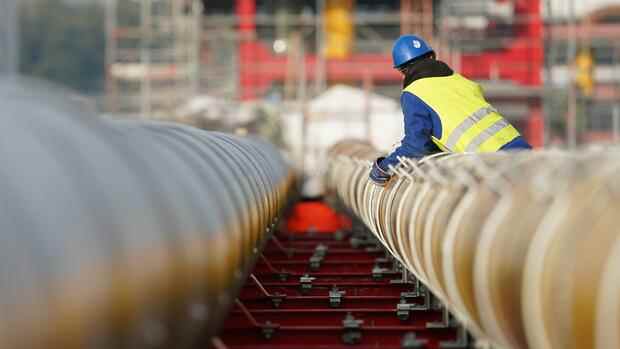Because there is a lack of gas capacity in Central Europe, companies are demanding rapid expansion.
(Photo: dpa)
Paris Energy groups from Germany and France are demanding massive investments in the European gas infrastructure. At the French-German Business Forum organized by the Handelsblatt and the French business newspaper “Les Échos” in Paris, top managers from both countries also demanded long-term supply contracts for liquefied natural gas (LNG). Without them, an affordable energy supply in Europe could not be secured.
“We discuss too much about how we can get prices under control in the short term,” said RWE boss Markus Krebber. However, the debate at European level must be more about a long-term solution.
“In the end, we can only get out of this crisis through long-term, massive investments in the energy supply,” said Krebber. This applies to both gas and renewable energies. In addition, Western corporations would have to conclude long-term contracts with supplier countries such as Qatar so that they could invest in gas production and liquefaction plants at all.
With a view to gas contracts running for 20 or 25 years, the federal government often has the reflex that they want to have the electricity sector decarbonized by 2035 and the entire economy by 2040. Ultimately, however, the necessary investments in the production countries would only be made if there was planning security for demand in Europe.
Top jobs of the day
Find the best jobs now and
be notified by email.
To put it plainly: If no one in Europe commits to buying gas in 2040, then there may not be enough production facilities and reloading stations in the gas supplying countries.
Central and Eastern Europe need more LNG capacities
The head of the French gas network operator GRTGaz, Thierry Trouvé, also called for a “much longer-term vision for the contracts in order to achieve stability”. Stéphane Michel, who is responsible for gas, renewables and electricity on the board of French energy giant Total Energies, said: “Increasing LNG imports is a shared responsibility of Europe.”
The RWE boss, together with French company bosses, spoke out in favor of more long-term goals.
(Photo: Bloomberg)
Total Energies has a stake in the floating LNG terminal at the port of Lubmin in Mecklenburg-Western Pomerania, which is scheduled to start operations early next year. According to Michel, further landing points for liquid gas are the “key” to securing the energy supply in the EU.
RWE boss Krebber said that Europe is “in a better position than we thought it would be” this winter. But there is still a two-part European gas market. In the western part with the Iberian peninsula and France there are “no volume restrictions whatsoever because there is enough LNG import capacity”. In the central and eastern part with Germany, the infrastructure is missing to replace the Russian gas supplies.
“The system is not yet so stable that it can withstand further stress,” said the RWE boss. Therefore, the LNG capabilities urgently need to be expanded and the gas pipeline network also needs to be geared towards west-to-east flow. “We will probably need until mid-2024 for this.”
The direction of flow at the only direct gas connection between Germany and France was already reversed a month ago. Since then, the French have been feeding up to 100 gigawatt hours into the German grid every day. Trouvé said the amount of gas is roughly equivalent to the power of three nuclear reactors.
>> Read here: The big barter – How Germany and France want to master the energy crisis together
The head of GRTGaz pointed out that France has also reversed the direction of flow to Belgium – and some of this gas also reaches Germany via this route. In the first ten months of 2021, France imported 17 terawatt hours via the Belgium route and exported 53 terawatt hours to Belgium in the same period of this year.
At the French-German Business Forum, the head of the French central bank, François Villeroy de Galhau, called for better planning for European companies when it comes to energy costs. Referring to the debate in the EU about lowering prices, he said: “We need a quick decision.”
The “worst enemy” of the economy is currently the uncertainty about energy bills. At the same time, he warned against too extensive aid packages from EU countries for companies in the energy crisis. “That would go against the common market and the sustainability of our public finances,” he said. “In the long term, we will not beat inflation with government spending, but by adjusting monetary policy.”
More: How Europe redirects its gas flows – and becomes independent of Russia

